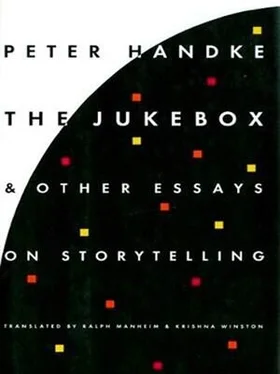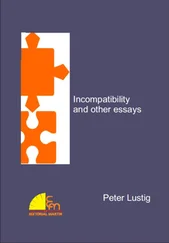But the scenes of violence, the clashes, the screams — did they become friendly forms on the vast horizon?
I have been speaking here of tiredness in peacetime, in the present interim period. In those hours there was peace, in the Central Park area as elsewhere. And the astonishing part of it was that my tiredness seemed to participate in this momentary peace, for my gaze disarmed every intimation of a violent gesture, a conflict, or even of an unfriendly attitude, before it could get started — this by virtue of a compassion very different from the occasional contemptuous pity that comes of creative tiredness: call it sympathy as understanding.
But what was so unusual about that gaze? Its special character?
I saw — and the other saw that I saw — his object at the same time as he did: the trees under which he was walking, the book he held in his hand, the light in which he was standing, even if it was the artificial light of a store; the old fop along with this light-colored suit and the carnation he was holding; the salesman along with his heavy suitcase; the giant along with the invisible child on his shoulders; myself along with the leaves blowing out of the park; and every one of us along with the sky overhead.
Suppose there was no such object?
Then my tiredness created it, and in a twinkling the other, who a moment ago had still been wandering about in the void, felt surrounded by the aura of his object … And that’s not all. Because of my tiredness, the thousands of unconnected happenings all about me arranged themselves into an order that was more than form; each one entered into me as the precisely fitting part of a finely attuned, light-textured story; and its events told themselves without the mediation of words. Thanks to my tiredness, the world cast off its names and became great. I have a rough picture of four possible attitudes of my linguistic self to the world: in the first, I am mute, cruelly excluded from events; in the second, the confusion of voices, of talk, passes from outside into my inner self, though I am still as mute as before, capable at the most of screaming; in the third, finally, life enters into me by beginning spontaneously, sentence for sentence, to tell stories, usually to a definite person, a child, a friend; and finally, in the fourth, which I experienced most lastingly in that day’s clear-sighted tiredness, the world tells its own story without words, in utter silence, to me as well as to that gray-haired onlooker over there and to that magnificent woman who is striding by; all peaceable happening was itself a story, and unlike wars and battles, which need a poet or a chronicler before they can take shape, these stories shaped themselves in my tired eyes into an epic and, moreover, as then became apparent to me, an ideal epic. The images of the fugitive world meshed one with another, and took form.
Ideal?
Yes, ideal: because in this epic everything that happened was right; things kept happening, yet there was not too much or too little of anything. All that’s needed for an epic is a world, a history of mankind, that tells itself as it should be. Utopian? The other day I read here on a poster: “La utopia no existe,” which might be translated as “The no-place does not exist.” Just give that a thought and history will start moving. In any case, my utopian tiredness of that day was connected with at least one place. That day I felt much more sense of place than usual. It was as though, no sooner arrived, I in my tiredness had taken on the smell of the place; I was an old inhabitant. And in similar spells of tiredness during the years that followed, still more associations attached themselves to that place. Total strangers spoke to me, perhaps because I looked familiar to them, or perhaps for no particular reason. In Edinburgh, where after looking for hours at Poussin’s Seven Sacraments , which at last showed Baptism, the Lord’s Supper, and the rest in the proper perspective, I sat radiant with tiredness in an Italian restaurant, feeling self-conscious about being waited on — an exceptional state related to my tiredness; all the waiters agreed that they had seen me before, though each in a different place, one in Santorin (where I have never been), another last summer with a sleeping bag on Lake Garda — neither the sleeping bag nor the lake was right. In the train from Zurich to Biel after staying up all night celebrating the end of the children’s school year, I was sitting opposite a young woman who had spent an equally sleepless night at a party celebrating the end of the Tour de Suisse bicycle race. On the instructions of the bank she worked for, which had co-sponsored the Tour, she had performed the duties of a hostess, distributing flowers and kisses to each prizewinner as he stepped forward … Her story came tumbling out of the tired woman as spontaneously as if we had known everything else about each other. One racer, who had won twice in a row and was rewarded with a second kiss, was so engrossed in his sporting prowess that he no longer recognized her, as she told me cheerfully, admiringly, and without a trace of disappointment. In addition to being tired, she was hungry, and she wasn’t going to bed, she was going to eat lunch with her girlfriend in Biel. There, I realized, was another explanation for her unsuspecting trustfulness: in addition to her tiredness, her hunger. The tiredness of the well fed can’t manage that. “We were hungry and tired,” says the young woman in Dashiell Hammett’s The Glass Key in telling Sam Spade her dream about the two of them: what brought them together, then and later, was hunger and tiredness. It seems to me that apart from children — the way they turn around and stare expectantly at the man sitting there — and other tired people, idiots and animals are most receptive to such tiredness. A few days ago an idiot here in Linares, hopping along absently hand in hand with a member of his family, seemed as startled at the sight of me, sitting on a bench exhausted by my literary efforts of the morning and afternoon, as if he had taken me for a fellow idiot or something even more amazing. Not only his Mongoloid eyes but his whole face beamed at me; he stopped still and had to be literally dragged away — his features expressing pure pleasure, simply because someone had seen him and acknowledged his existence. And this was not a unique occurrence. In many a time and place the idiots of the world, European, Arab, Japanese, presenting the drama of themselves with childlike pleasure, have been drawn into this tired idiot’s field of vision. Once in Friuli, not far from the village of Medea, when exhausted after completing a piece of work and walking for hours across the treeless plain, I came to the edge of a forest and saw two ducks, a deer, and a hare lying together in the grass. Catching sight of me, they seemed about to take flight, but then resumed their even rhythm; pulling up grass, browsing, waddling about. On the road near the Poblet monastery in Catalonia I fell in with two dogs, a big one and a small one, who may have been father and son. They joined up with me, sometimes following me, sometimes running on ahead. I was so tired that I forgot my usual fear of dogs, and besides, or so I imagined, my long wanderings in the region must have steeped me in its smell, so the dogs took me for granted. True enough, they began to play, the “father” describing circles around me and the “son” chasing him between my legs. Great, I thought. Here I have an image of true human tiredness: it creates openings, making room for an epic that will encompass all beings, now including the animals. Here perhaps a digression may be in order. In the chamomile-scented rubble outside Linares, where I go for a walk each day, I have observed very different interactions among human beings and animals. I can speak of them only in shorthand. Those scattered forms apparently resting in the shadows of the ruins or stone blocks but actually lying in ambush, within gunshot of the little cages fastened to flexible poles planted in the rubble. Cages so tiny that the fluttering of the inmates makes them sway, thus offering larger birds an alluring mobile bait. (But the shadow of the eagle is far away, sweeping across my paper as I sit in my eerily quiet eucalyptus grove hard by the ruins of the lead mine, my open-air studio during the ecstatic bellowing and trumpeting of the Spanish Easter Week);—or those excited children running out of the gypsy encampment on the heath, a sleek noble-headed dog frolicking around them, yelping with eagerness at the sight of the spectacle organized by a boy-almost-man: hare let loose on the savanna, dog speeding in pursuit, hare twisting, turning, and doubling back, but soon caught, dropped, caught again more quickly than before, flung this way and that in the dog’s jaws. Dog racing across field, hare squeaking interminably, show ending with return of children to camp, dog jumping up, ringleader boy holding out hand, grabbing hare by ears; the hare wet with blood, still twitching a little, its paws go limp; its little face, seen in profile, held high above the children’s heads, utterly helpless and forlorn, more sublime than the face of any animal or human being, leads the procession into the sunset. — Or only the other day, as I was on my way home to town from writing in the eucalyptus grove, a crowd of teenagers by the stone wall around the olive field, brandishing olive branches and reeds, shouting, running forward and back, pushing and kicking at a pile of stones, and from under the stones, now visible in the sunlight, a long, thick, coiled snake, at first barely moving, just the twitching of the head and the darting of the tongue — still heavy with winter sleep? Reeds raining down from all sides, splintering yet lethal; the assailants, hardly more than children, myself among them as I remember it, still howling and rushing back and forth; at last the snake rearing to full height yet cutting a pathetic figure, in no position to attack, not even threatening, just mechanically executing the hereditary gesture of the snake, and thus upraised in profile, with head crushed and blood flowing from its mouth, suddenly, just before collapsing under the shower of stones like the hare, a third figure, something like the one that appears for a moment at the back of the stage while the curtain, painted with the usual human and animal forms, rises. But why do I persist in telling and retelling such horrors, which communicate no story but at the most lend confirmation, while what my unifying tirednesses have to tell me calls forth again and again a natural stretching out which induces an epic breathing.
Читать дальше












